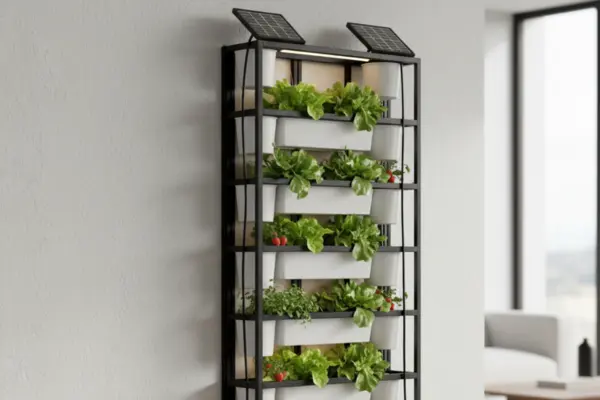Vertical gardens often need more than soil and plants—they also rely on pumps, timers, fans, and grow lights. But what if your setup is on a balcony with no outlet, a community plot without electricity, or even an off-grid cabin? That’s where portable power solutions come in.
With the right setup, you can run your vertical garden independently, ensuring plants get consistent water and light even without traditional power. In this guide, we’ll cover the best portable power options, their pros and cons, and how to choose the right system for your needs.
Start by estimating your power needs so you don’t overbuy. Add up the watts for your pump, timer, fan, and lights, then multiply by the hours they run to get daily watt-hours (Wh). Match that number to a portable power station (battery) plus a solar panel if you want recharge independence.
Look for pure sine-wave outputs for sensitive gear, weather-resistant cases, and enough ports (AC + DC + USB). For safety, use drip loops, outdoor-rated cords, and keep batteries shaded and off wet surfaces.
Why Off-Grid Power Matters in Vertical Gardening
Reliability:
When the grid goes down, plants still need water. A small battery or solar setup keeps pumps and timers running, so top rows don’t dry out and nutrients keep circulating. That stability prevents stress, wilt, and lost harvests—especially during heat waves.
Flexibility:
Off-grid power lets you build a garden where outlets don’t exist—balconies, rooftops, patios, community plots, even cabins. You can place towers for best light and airflow instead of being tied to one wall because that’s where the plug is.
Sustainability:
Portable solar panels and rechargeable power stations reduce reliance on fossil-fuel electricity. By topping up with sunlight and using efficient DC pumps and LED grow lights, you cut your energy footprint while keeping plants healthy.
Convenience:
No more messy extension cords, tripping hazards, or drilling through walls. A tidy, self-contained battery + solar kit keeps wiring minimal and setup clean, making maintenance and seasonal rearranging much easier.
Top Portable Power Options
1. Solar Power Kits
- Panels collect sunlight and store energy in batteries.
- Ideal for outdoor vertical gardens.
- Works best in sunny climates.
- Can power pumps, timers, and even LED lights.
Pros: Renewable, low running cost.
Cons: Weather-dependent, higher upfront cost.
2. Rechargeable Battery Packs
- Compact and versatile, often used for camping.
- Can power small pumps or lights for several hours.
- Easy to recharge with a wall outlet or car adapter.
Pros: Affordable, portable.
Cons: Limited runtime, frequent recharging needed.
3. Portable Power Stations
- Larger, all-in-one units with multiple outlets (AC, DC, USB).
- Can run larger systems for extended periods.
- Some models include solar panel compatibility.
Pros: Reliable, flexible, long-lasting.
Cons: More expensive and heavier than battery packs.
4. Small Wind Turbines (Supplemental Option)
- Works well in consistently windy areas.
- Can be combined with solar for hybrid systems.
Pros: Generates power even at night.
Cons: Less predictable, requires outdoor setup.
Matching Power to Garden Needs
Before buying, calculate your system’s energy requirements:
- Small towers (pump + timer): 10–30 watts daily.
- Medium gardens (pump + timer + LED lights): 50–150 watts daily.
- Large setups (multiple towers + automation): 200+ watts daily.
A basic solar kit or portable station is usually enough for small-to-medium gardens.
Quick Comparison Table
| Power Option | Best For | Pros | Cons |
| Solar Power Kit | Outdoor gardens | Renewable, low-cost long term | Weather-dependent |
| Battery Pack | Small towers | Affordable, compact | Limited runtime |
| Power Station | Medium–large setups | Reliable, versatile | Expensive, heavy |
| Wind Turbine (add-on) | Windy areas | Works at night | Unpredictable output |
Common Mistakes to Avoid
- Underestimating power needs – always calculate watt usage before buying.
- Ignoring battery storage – solar panels alone won’t power pumps at night.
- Choosing oversized systems – wasting money on power you don’t need.
- Skipping weather protection – batteries and stations should stay dry and sheltered.
FAQs
Q: Can solar panels run a pump all day?
Yes, with proper battery storage. Direct sunlight alone isn’t enough for continuous power.
Q: How long does a portable power station last?
Most provide several hundred charging cycles, lasting 3–5 years with regular use.
Q: Are portable battery packs safe for outdoor use?
Yes, but always protect them from rain or extreme heat.
Q: Can I combine solar and battery packs?
Absolutely. Many systems pair solar charging with portable batteries for flexibility.
Q: What size battery do I need?
Calculate daily watt-hours (pump + lights + fans × hours). Choose a battery with at least 1.5–2× that number to cover cloudy days and inefficiencies.
Q: Do I need a pure sine-wave inverter?
Yes for sensitive gear (timers, some pumps, LED drivers). If everything is DC-compatible, you can skip the inverter and run more efficiently.
Next Steps & Related Reading
If you’re building the structure itself, see DIY Mounting Systems: Brackets, Rails & Planter Hooks.
For long-term upkeep, check How to Sterilize & Store Equipment Between Growing Seasons.
Conclusion
Portable power makes vertical gardening possible almost anywhere—from city balconies to remote cabins. By choosing between solar kits, battery packs, or full power stations, you can design a reliable, eco-friendly setup that keeps your plants thriving year-round.
Would you prefer the independence of a solar kit, or the convenience of a plug-and-play power station?




